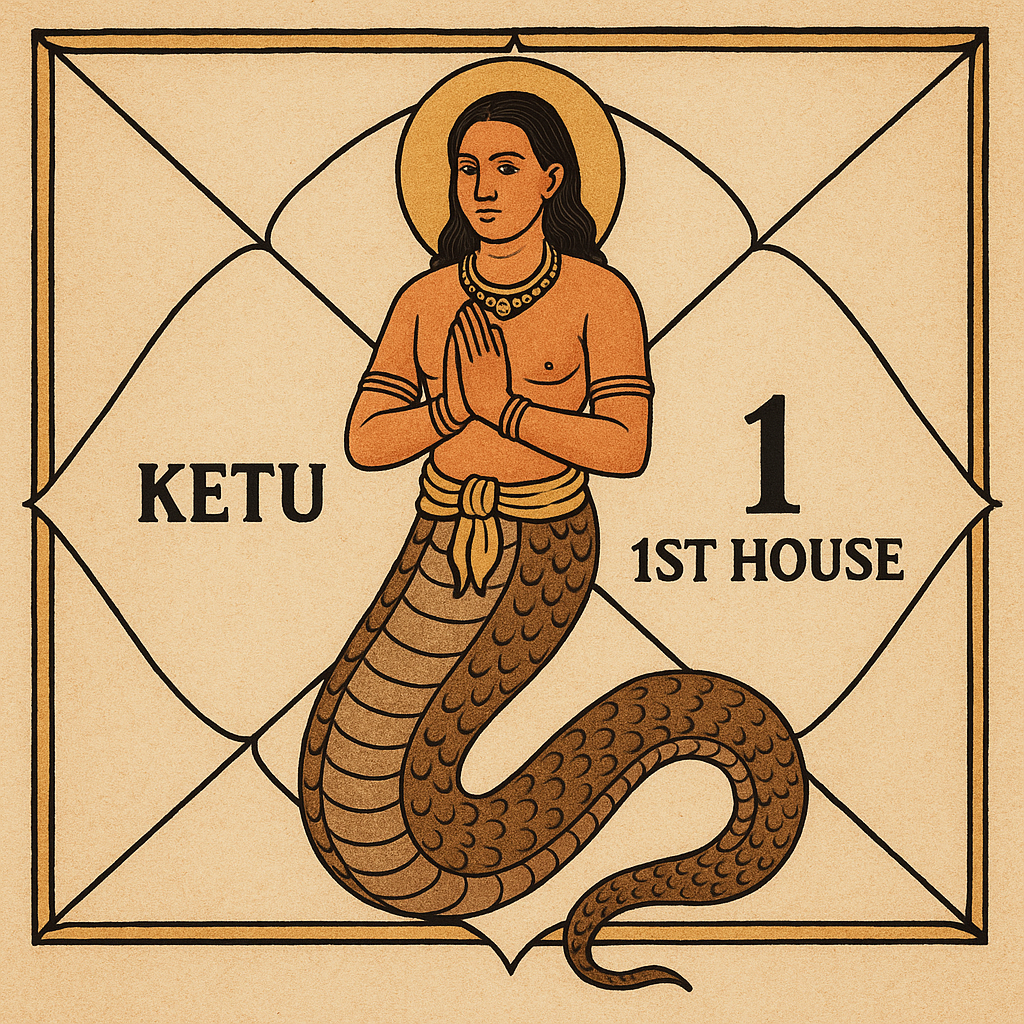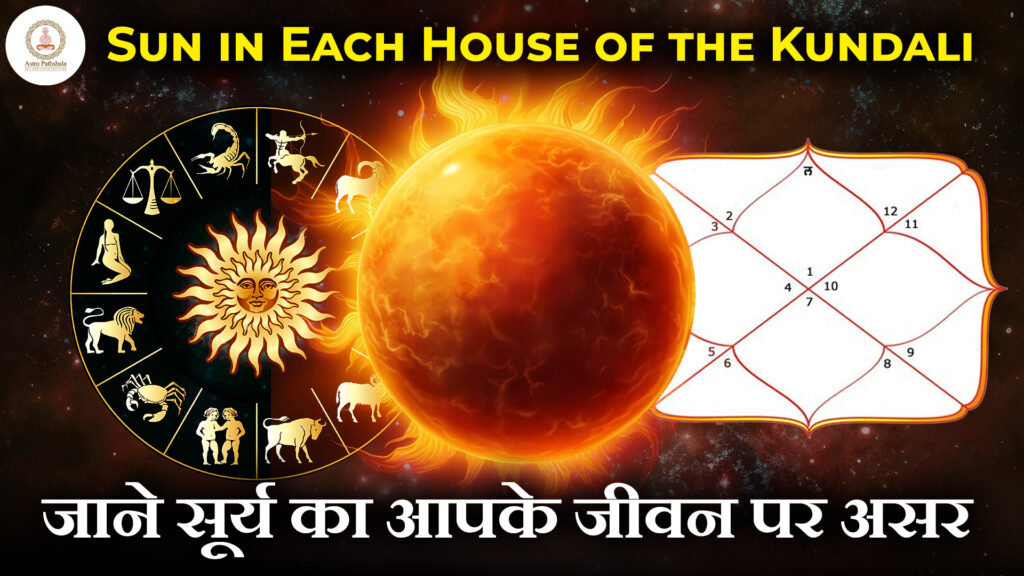In the celestial canvas of Vedic astrology, the planets are not just celestial bodies; they’re
karmic indicators that shape our destiny, personality, and life journey. Among them, Ketu stands
apart for its intensely spiritual yet detaching influence.
Unlike the material and desire-driven Rahu, Ketu is the planet of renunciation, moksha
(liberation), and detachment. Its placement in the birth chart reveals our past life mastery and
shows what we are innately familiar with but must detach from in this lifetime.
When Ketu is placed in the 1st house; the house of self, body, identity, and appearance
influence is profound, transformative, and often misunderstood.
Dive through this blog to know the effects, personality traits, challenges, spiritual meanings,
and remedies associated with Ketu in the 1st house.
Understanding Ketu and The 1st House
In Vedic astrology, Ketu is not a physical planet but a shadowy celestial point, known as the
South Lunar Node. It is the point where the Moon’s orbit intersects the ecliptic (the Sun’s
apparent path) as it descends southward. Along with Rahu (the North Node), Ketu forms the
karmic axis of a natal chart and plays a crucial role in shaping a person’s spiritual evolution,
past-life karma, and inner journey.
Symbolism and Mythological Background
In Hindu mythology, Ketu originates from the story of the Samudra Manthan (Churning of the
Ocean). A demon named Swarbhanu disguised himself and drank the nectar of immortality.
Lord Vishnu, realizing the deception, decapitated him. The head became Rahu, and the body
became Ketu. Thus, Ketu is often referred to as the “headless body”, symbolizing
detachment from materialism and a focus on spiritual liberation.
Ketu’s Core Symbolism:
1. Detachment and Renunciation
● Ketu represents detachment from worldly desires, comforts, and ego.
● It tends to bring circumstances that force a person to let go, whether it be material
possessions, relationships, or identity.
● People with a strong Ketu influence often feel disconnected from the material world,
and may seek solitude, minimalism, or spiritual practice.
2. Past Life Karma and Spiritual Knowledge
● Ketu is deeply connected to past life actions (karma) and ancestral memories.
● It governs the karmic residues that one carries into this life for resolution.
● A well-placed Ketu can bless an individual with innate wisdom, especially in spiritual or
mystical matters, often gained from previous lifetimes.
3. Mysticism, Moksha, and Intuition
● Ketu is a major indicator of the moksha (liberation) path.
● It enhances psychic sensitivity, clairvoyance, and the desire to transcend the ego.
● Its influence can lead one toward meditation, occult sciences, or transcendental
experiences.
● It is often found strong in the charts of yogis, sages, mystics, and spiritual seekers.
4. Loss, Surrender, Isolation
● Ketu often brings losses; not to punish, but to teach.
● It forces surrender, often through difficult experiences such as emotional detachment,
isolation, or abandonment.
● These losses push the individual toward self-inquiry, acceptance, and
non-attachment.
5. Accidents, Confusion, and Psychic Ability
● Ketu’s influence can be disorienting or disruptive, especially when poorly placed or
afflicted.
● It can cause accidents, sudden changes, and unexplained events that challenge
logic.
● It may also bring psychological confusion, dissociation, or hallucinations if not handled
well.
● However, when harmonized, this same energy fosters deep insight, intuitive power,
and otherworldly perception.
Astrological Characteristics of Ketu:
● Nature: Malefic (but spiritual in higher aspect)
● Element: Spiritual (subtle, non-material)
● Sign Lordship: None (though traditionally co-rules Scorpio or Pisces in some schools)
● Exalted in: Scorpio (or Sagittarius by some views)
● Debilitated in: Taurus (or Gemini, depending on tradition)
● Associated with: Mars (similar in energy – intense, cutting, aggressive but inwards)
Ketu is considered a malefic, but it’s a spiritualizing force that removes illusion and ego.
What does the 1st House represent?
The 1st house or Lagna (Ascendant) is the foundation of the natal chart. It governs:
● Physical body and health
● Personality and self-identity
● Outlook on life and confidence
● Appearance and first impression
● Overall life direction
When Ketu, a planet of detachment and past karma, enters this most personal house, it can
have significant and often paradoxical effects.
General Effects of Ketu in the 1st House
Ketu in the 1st house is often associated with a person who is inwardly spiritual, yet
outwardly detached or disinterested in worldly affairs. Such natives often appear mysterious,
intense, or indifferent. Their life is heavily influenced by subconscious past-life experiences.
Positive Effects
1. Spiritual Inclination
These individuals are drawn to spiritual or mystical subjects from a young age. They may
have natural psychic abilities or intuitive insight.
2. Detached and Independent
They are self-reliant and usually not swayed by peer pressure or societal norms. Their
inner strength comes from not needing external validation.
3. Minimalist and Humble
Ketu grants humility. These people often lead a simple life and are indifferent to fame or
material status.
4. Quick Learners of Spiritual Truths
Due to past-life karmic mastery, they can understand deep philosophical or metaphysical
ideas easily.
5. Mature and Wise
Even in youth, such individuals may appear older, wiser, or more serious than their
peers.
Negative Effects
1. Identity Confusion
Ketu present in the 1st house of the horoscope can blur self-image. The person may
struggle with the question: Who am I really? They may feel disoriented or lack a clear life
direction.
2. Detachment from Body or Health Neglect
The native might ignore bodily needs or suffer from unknown or misdiagnosed health
issues.
3. Social Withdrawal
A tendency to isolate or withdraw from society, friends, or even family. They may avoid
gatherings or be perceived as aloof.
4. Low Self-Confidence or Passive Personality
They may lack assertiveness or the drive to compete. In some cases, it leads to a
defeatist or escapist attitude.
5. Sudden Accidents or Surgeries
Ketu in the Lagna may bring unanticipated health issues, accidents, or injuries,
especially related to the head or nervous system.
Psychological Traits of Ketu in 1st House
● Introverted and Reflective – Deep thinkers who prefer solitude over social noise.
● Old Soul Vibe – They often seem mature beyond their years or feel out of place in
modern life.
● Non-Attachment to Ego – A humble demeanor, sometimes bordering on a lack of
self-worth.
● Mysterious Personality – They can be difficult to understand or predict, even by close
friends and family.
● Emotionally Sensitive – Though not always expressive, their inner emotional world is
rich and nuanced.
Life Path and Karmic Themes
Ketu in the 1st house indicates past-life experiences of fame, leadership, or individual
achievement. The soul, having already explored the domain of self-importance, is now learning
to surrender the ego and focus on partnerships, balance, and cooperation (since Rahu is in
the 7th house).
Key karmic lessons include:
● Letting go of ego-based identity
● Embracing collaboration and relationships
● Releasing control and accepting divine guidance
● Walking a spiritual path with humility
Career Impact
People with Ketu in 1st house often face a non-linear career path. They may start something,
lose interest, and move on. However, they thrive in careers that involve research, healing,
spirituality, or service.
Suitable Fields:
● Spiritual leadership or guidance
● Healing professions (Reiki, Ayurveda, etc.)
● Psychology and counseling
● Writing, philosophy, and mysticism
● Social work or NGO involvement
● Occult sciences: astrology, tarot, tantra
They may shy away from competitive or high-profile fields unless other planets (like Sun or
Mars) provide ambition and direction.
Remedies for Ketu in the First House
Ketu in the First House (Lagna) can bring significant psychological, emotional, and spiritual
challenges. While it also offers potential for deep spiritual growth, the initial impact is often
confusion, detachment, isolation, and a lack of direction or identity. Individuals may feel lost,
misunderstood, or disconnected from themselves and the world around them.
To balance and harmonize the effects of Ketu in the first house, several Vedic remedies and
lifestyle practices can be adopted. These are aimed not at “removing” Ketu—since its
influence is karmic—but at understanding, neutralizing, and transcending its negative
effects.
1. Spiritual Practices and Meditation
Ketu is a moksha-karaka (indicator of liberation). The best remedy is not to fight Ketu but to
align with its higher purpose through spiritual discipline.
● Daily meditation, especially focusing on breath awareness, mantra chanting, or
mindfulness, helps calm the restless mind and integrate Ketu’s energy.
● Practicing Vipassana or Jnana Yoga (the path of knowledge) can be especially
beneficial for those dealing with existential confusion.
● Avoid escapism; instead, use introspection to understand your true nature beyond the
ego.
2. Worship and Rituals
Worship Lord Ganesha
● Lord Ganesha is traditionally associated with Ketu. Daily prayer to Ganesha helps
remove obstacles and confusion brought by Ketu.
● Chanting “Om Gan Ganapataye Namaha” 108 times daily can bring peace and clarity.
Perform Ketu Shanti Puja
● A Ketu Shanti Homam or Puja performed by a qualified Vedic priest can help reduce
the malefic impact of Ketu, especially during Ketu Mahadasha or Antardasha.
Donate on Tuesdays and Saturdays
● Donate black cloth, sesame seeds, mustard oil, blankets, or a multi-colored dog (symbol
of Ketu) to a temple or to the poor.
● Feed stray dogs, especially black or spotted ones.
3. Mantras and Yantras
Ketu Beej Mantra:
Reciting Ketu’s seed mantra daily can help align your energy with its higher vibration:
“Om Sraam Sreem Sraum Sah Ketave Namah” – Repeat 108 times daily.
Ketu Yantra:
Keep a Ketu Yantra (sacred geometric diagram) in your prayer space and meditate on it. This
balances Ketu’s influence on the subconscious mind.
4. Grounding and Routine
Ketu in the 1st house can make you mentally scattered or spiritually ungrounded. To stabilize:
● Establish a daily routine with regular waking, eating, and sleeping times.
● Engage in grounding activities like gardening, walking barefoot on grass, or cooking.
● Avoid over-indulging in fantasy, escapism, or detachment from reality.
5. Strengthen the Opposite House (7th House – Rahu)
Ketu in the 1st house always means Rahu is in the 7th house. Your karmic growth comes from
balancing both:
● Build healthy relationships and learn to relate with others.
● Practice cooperation, diplomacy, and communication.
● Engage in teamwork or partnerships—this helps offset the loneliness caused by Ketu.
6. Avoid Negative Traits of Ketu
● Stay away from pessimism, isolation, stubbornness, or rejecting worldly
responsibilities.
● Avoid black magic, occult misuse, or drug abuse—these can worsen Ketu’s malefic
results.
Conclusion
The goal with Ketu in the 1st house is not to remove its influence, but to understand and
transcend it. Through spiritual discipline, service, self-inquiry, and connection with
others, one can turn the confusing and isolating aspects of Ketu into a powerful force for
liberation, wisdom, and inner peace. Embrace Ketu not as a curse, but as a call to awaken
the eternal self beyond ego.
How to See Love Marriage Yoga in Kundali: A Complete Astrological Guide
How to Use a Kundali to Predict a Government Job: Career guidance




Pingback: Rahu in the First House: Illusions, Obsessions, and Magnetic Aura -